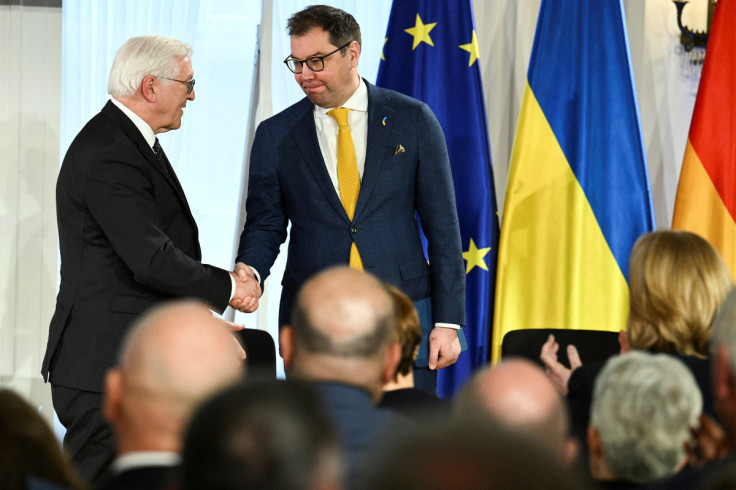Ukraine Envoy Says Germany Showing More Leadership On Arms Deliveries

Ukraine's envoy to Berlin said Germany is taking more of a leadership role in organising deliveries of arms to Kyiv and has stopped making what he called excuses to avoid sending weapons.
Germany was initially reluctant to send heavy arms to Ukraine to help it confront Russia's invasion, fearing it might escalate the fight. But in January Berlin agreed to send its Leopard tanks and said it would work with allies to send more.
"What has changed in the last few months is we are not just discussing the current order of the day but we are strategically planning according to what is needed and what can be delivered," Ukrainian Ambassador Oleksii Makeiev told Reuters.
"There are no more excuses now but facts that we talk about."
On Friday, the Swiss government said Germany had asked it to sell some of its Leopard tanks back to arms maker Rheinmetall, which would allow the company to backfill gaps in the armaments of European Union and NATO members.
Makeiev's conciliatory words were in stark contrast to the harsh tone of his predecessor Andriy Melnyk, who regularly chastised Germany for not doing enough to help it fight off the invasion, which Moscow calls a "special military operation".
Germany's decision in January, made after the U.S. agreed to send its own M1 Abrams tanks, broke through one of the last taboos in Western support for Ukraine: providing arms that have a mainly offensive rather than defensive purpose.
At the time, Russia reacted with fury, saying Berlin was abandoning its "historical responsibility to Russia" arising from Nazi crimes in World War Two when Hitler's forces invaded the Soviet Union.
TANKS AND GUARANTEES
The Ukrainian envoy said the military items Kyiv most needed were air defence systems, battle tanks, artillery and ammunition.
"We need more ammunition and more long-distance artillery to destroy Russian supply chains," Makeiev said, speaking in his office on Thursday in front of a whiteboard covered with photos representing this wish list.
Ukraine was not currently pushing Germany to send fighter jets, Makeiev said, even if it was discussing possible deliveries of jets with other allies.
"We discuss what we need with allies in a very precise and content-rich manner," he said, sporting a blue suit and yellow tie, the colours of the Ukrainian flag.
"Until this moment, I have not received from our defence ministry any request for a certain type of plane available in Germany."
German Chancellor Olaf Scholz said on Thursday he was in talks with allies about giving future security guarantees to Ukraine, without specifying what they might be.
Makeiev said Ukraine welcomed discussions about offers security guarantees for its post-war future ands said they were not being made to persuade Ukraine to weaken it stance on Russia.
"The best security guarantee for Ukraine is NATO membership," Makeiev said.
Many other European countries would want some kind of security guarantees after the end of the war, he added.
"So for us it is important that Russia is deprived of the capacity to wage war anywhere in the neighbourhood after Ukraine wins this war."
Moscow, which says it has annexed nearly a fifth of Ukraine, accuses Kyiv of posing a security threat. Ukraine and its allies say the invasion was an unprovoked war to conquer land.
Makeiev said he hoped most Ukrainian refugees would return eventually to help rebuild the country. Germany has taken in around 1 million refugees and a recent survey showed more than a third wanted to stay.
Scholz was due to hold talks on Friday in Washington with U.S. President Joe Biden about the war in Ukraine amid growing concerns that China may provide weapons to Russia.
© Copyright Thomson Reuters 2024. All rights reserved.





















